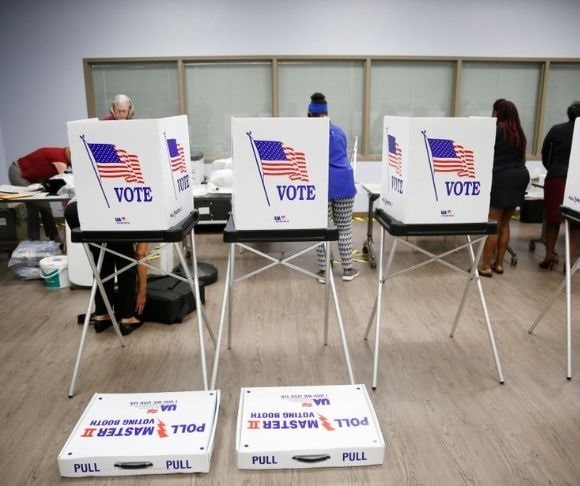American interest in presidential politics is outdone only by the fascination with gubernatorial battles. And why wouldn’t it be? States are where the most immediately impactful laws are made, and the ruler of each of these little kingdoms is the governor. This election season will see 36 competitions to determine who gets the mansion, but beyond local politics, some races have garnered national attention. Polls and betting markets often provide better clarity than social media and talking heads on cable news; as such, Liberty Nation presents an analysis of the big races this cycle.
Gubernatorial Battles
Georgia
Once thought a contender to become Joe Biden’s vice president, Stacey Abrams is taking another shot at the governor’s mansion in Georgia. The 2018 contest saw Abrams, a Democrat, come within less than one-and-a-half percent of defeating GOP candidate Brian Kemp. Since then, Abrams’ public profile – and pocketbook – have swelled considerably, but does this denote a better chance of winning?
Abrams has not led in a single poll since January; her best performance was a tie back in late June, which coincided with the Supreme Court decision to overturn Roe v. Wade. An aggregate of polling data puts Kemp a comfortable 4.6 points ahead in the Peach State. The betting markets give Kemp a 74% chance of winning re-election on 1/3; Abrams, on the other side of the equation, has a 33% chance of winning – or 2/1 odds.
She has yet to concede her 2018 loss.
Florida
The Sunshine State should be an easy capture for incumbent GOP Governor Ron DeSantis, but with his outsized profile making him a Fourth Estate target, the Florida gubernatorial contest has become national news. Going up against DeSantis is former governor and recently resigned Representative Charlie Crist. Having run for office on 16 separate occasions, Crist knows how to campaign. However, his chameleonic political persona – shifting from Republican to Independent to Democrat – likely has voters worried he is involved in the race for personal benefit rather than public service.
Back in 2018, newcomer DeSantis barely scraped a win against Democrat contender Andrew Gillum and was only declared the victor after a recount. With just a 0.4% lead, this was the closest a Democrat had come to taking the Florida governorship in almost 20 years. After his defeat, Gillum went from one scandal to the next and was recently indicted on 21 felony counts.
DeSantis has a polling lead aggregate of more than seven points, giving Crist a steep hill to climb in a state that not only backed Trump in 2016, but came back in 2020 to support him even more. The incumbent governor is widely seen as an America First candidate and possible successor to Trump himself. The betting odds paint a similar picture, handing DeSantis a more than 90% probability of a win at 1/10. Crist trails with only a 6/1 chance.

Kari Lake (Photo by Brandon Bell/Getty Images)
Arizona
Republican Gov. Doug Ducey is term-limited, and, as such, Democrats hope to swing the Grand Canyon State’s mansion back to their control. GOP candidate Kari Lake will face Katie Hobbs in what onlookers expect to be a close battle. Although Arizona’s electorate has only backed one Democrat for the job in the last 30 years, a swing toward Joe Biden in 2020 has Dems rubbing their hands with glee. Even more at stake is the party’s political messaging campaign that would be derailed if Trump-backed Lake takes the win. This swing state could be a stark signal to those hoping for a 2024 victory.
Polling on this race is scarce, and the two available surveys report vastly different results. In a Trafalgar Group poll, Lake has a one-point lead; in a Fox poll, Hobbs heads the field with plus three. It is worth noting, however, that although both surveys questioned more than 1,000 individuals, the Trafalgar poll was of likely voters rather than Fox’s registered voters. The cash money bettors give Lake a slight advantage of 66% against Hobbs’ 39%.
This race will almost certainly come down to boots-on-the-ground campaigning.

Greg Abbott (Photo by Michael M. Santiago/Getty Images)
Texas
Incumbent GOP Governor Greg Abbott faces what is being billed as a mighty challenge by failed Senate and presidential candidate Beto O’Rourke. Much like Abrams in Georgia, it seems some contenders fail upwards, and with O’Rourke, much of the excitement comes from the same quarters that backed his prior unsuccessful efforts.
Abbott has recently loomed large in the national spotlight after chartering buses to take illegal immigrants to New York. While he has undoubtedly faced criticism for the move, it has highlighted a level of hypocrisy in those who clamor about sanctuary cities and then claim not to be able to handle the influx of a mere few thousand. O’Rourke has – until a recent bacterial infection caused him to suspend campaigning – been running a solid multi-media charge. Plenty of rallies and short snappy videos ensure that he remains a darling of the press. A deluge of polling, however, paints a stunningly one-sided picture.
According to RealClearPolitics, Abbott has led in every single one of the last 19 polls. In fact, the incumbent is sitting on a comfortable 6.8-point aggregate advantage over O’Rourke. And the betting odds are no different. The two-term governor has a 90% chance to win a third, while O’Rourke trails on 18%. Unless Abbott makes a colossal mistake between now and November, the Lone Star State is remaining red.
More to come…
The other major contests to watch this election cycle are the Senate races that will determine who ultimately has legislative control for the next two years. Check back tomorrow for our analysis of the season’s most contentious and anticipated contests.




